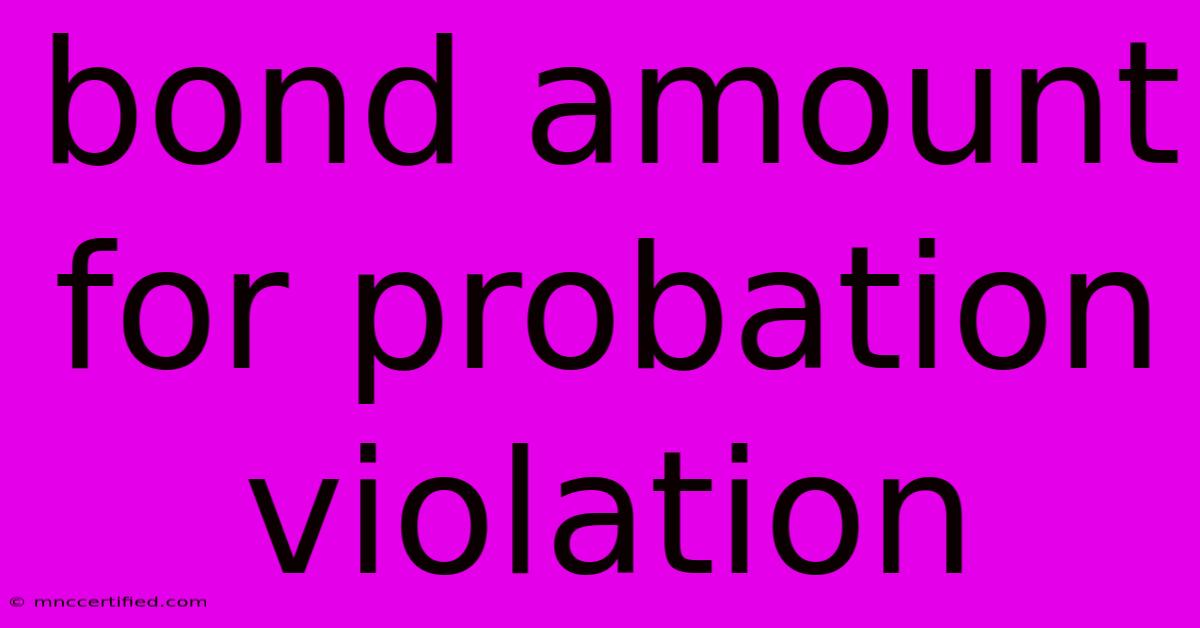Bond Amount For Probation Violation

Table of Contents
Understanding Bond Amounts for Probation Violations: What You Need to Know
Being placed on probation is a chance to avoid jail time and demonstrate positive changes in your life. However, violating probation can lead to serious consequences, including a revoked probation and incarceration. One crucial aspect of this process is understanding the bond amount for probation violation.
What is a Bond Amount?
A bond amount is a financial guarantee that ensures you'll appear in court for your probation violation hearing. It's essentially a form of insurance for the court, ensuring they can collect on any fines or restitution owed if you fail to show up.
Factors Affecting Bond Amounts for Probation Violations
The bond amount for a probation violation can vary significantly depending on several factors:
- Severity of the Violation: More serious violations, such as committing a new crime or failing a drug test, are likely to result in higher bond amounts.
- Previous Criminal History: Individuals with a lengthy criminal history may face higher bond amounts.
- Flight Risk: If the court believes you are at risk of fleeing, the bond amount will likely be higher.
- Financial Resources: The court may consider your financial resources when setting the bond amount.
Types of Bonds
Several types of bonds are available for probation violations:
- Cash Bond: This involves paying the full bond amount in cash.
- Surety Bond: This involves working with a bondsman who will pay the bond amount for you, but you'll need to pay a non-refundable fee, usually 10% of the bond amount.
- Property Bond: This allows you to use a piece of property as collateral for the bond.
- Personal Recognizance Bond (PR Bond): This is granted without any financial obligation, but only if the court believes you pose a low risk of fleeing.
What Happens If You Can't Afford the Bond?
If you can't afford the bond amount, you have a few options:
- Request a Lower Bond: You can ask the court to lower the bond amount based on your financial situation.
- Public Defender: If you qualify, a public defender can represent you and assist in securing a lower bond.
- Bail Fund Organizations: Some organizations help individuals afford bail by providing financial assistance.
Understanding the Consequences of Failing to Pay Bond
Failing to pay the bond amount or appearing in court can lead to:
- Issuance of a Warrant for Your Arrest: The court may issue a warrant for your arrest, leading to your immediate detention.
- Revocation of Probation: You could face the revocation of your probation and be sentenced to jail for the original crime.
- Additional Fines and Penalties: You may face additional fines and penalties for failing to appear in court or pay the bond.
Seeking Legal Advice
If you are facing a probation violation, it's essential to consult with an attorney as soon as possible. An experienced lawyer can advise you on your rights, negotiate with the court, and help you navigate the legal process.
Conclusion
Understanding the bond amount for probation violations is crucial to ensuring your freedom and protecting your legal rights. Remember, it's vital to take the process seriously and follow all court orders to avoid potential complications and consequences.

Thank you for visiting our website wich cover about Bond Amount For Probation Violation. We hope the information provided has been useful to you. Feel free to contact us if you have any questions or need further assistance. See you next time and dont miss to bookmark.
Featured Posts
-
Franklin Templeton Global Bond Fund
Nov 12, 2024
-
Megan Fox Posts Daring Photo Makes Announcement
Nov 12, 2024
-
Benny Blanco Spills On Selena Gomezs Romantic Date
Nov 12, 2024
-
Farmers Insurance Settlement Checks
Nov 12, 2024
-
Elise Stefanik Trumps Un Ambassador Choice
Nov 12, 2024